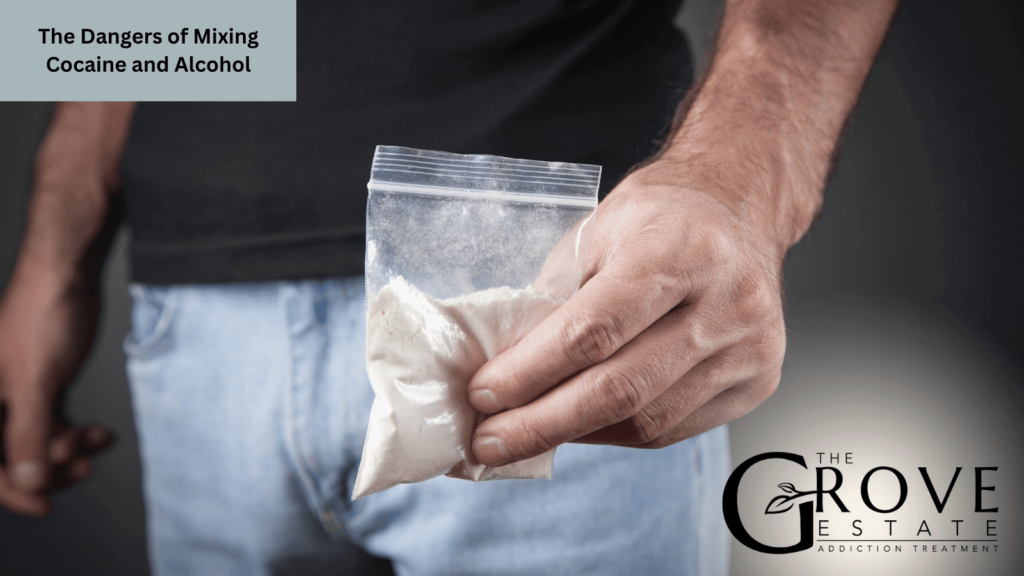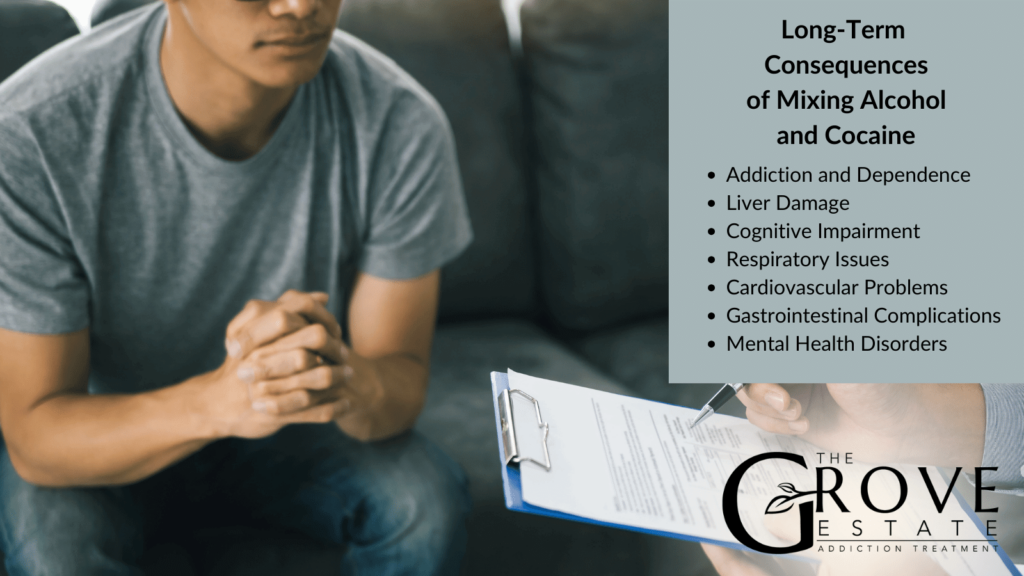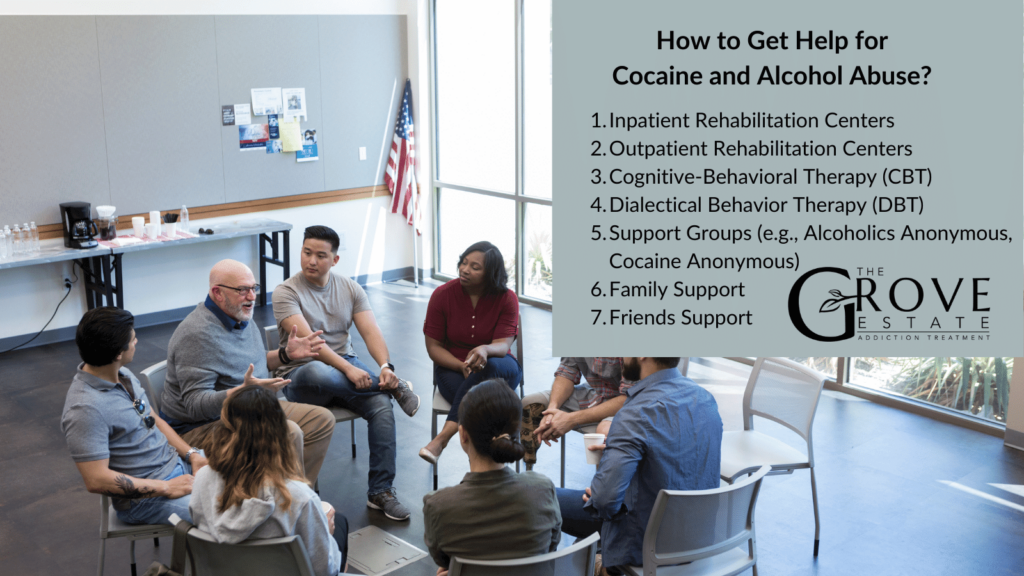Mixing alcohol and cocaine is a perilous trend with severe health risks. Alcohol and cocaine are among the most commonly abused substances worldwide. According to the World Drug Report by the United Nations Office on Drugs and Crime, cocaine use has been rising, with 20 million people using it globally in 2019. The combination of alcohol and cocaine significantly amplifies the substances’ effects and creates a compound called cocaethylene, which can increase the euphoric effects but also heightens the risk of sudden death.
Given the serious health risks and the complex challenges in treating co-abuse of these substances, there is a growing concern in the medical and public health communities about the need for increased awareness and prevention efforts targeting the dangers of mixing alcohol and cocaine.

What is Cocaine?
Cocaine is a powerful stimulant drug derived from the coca plant, primarily found in South America. It is used for its euphoric effects, which include increased energy, alertness, and feelings of extreme happiness. Cocaine can also decrease appetite and the need for sleep. The drug works by increasing levels of dopamine, a neurotransmitter associated with pleasure and reward, in the brain.
Cocaine comes in several forms, including:
- Powdered cocaine (Cocaine hydrochloride): A fine white powder that is often snorted through the nose, rubbed onto the gums, or dissolved in water and injected.
- Crack cocaine: A form of cocaine that has been processed to make a rock crystal, which is then heated and smoked. The term “crack” refers to the crackling sound made by the rock as it is heated.
- Freebase cocaine: A compound that is a smokable form of cocaine, created by removing the hydrochloride salt from powdered cocaine.
The effects of cocaine are immediate, intense, and short-lived, leading to repeated use to sustain the high and avoid the crash that follows. This pattern can quickly lead to addiction. The use of cocaine can cause serious health effects, including heart attack, stroke, and mental health disorders. It can also lead to behavioral changes, such as increased aggression, impulsivity, and paranoia.
How Does Alcohol Interact with Cocaine?
The combination of alcohol, a depressant, with cocaine, a stimulant, creates a complex interaction in the body. Alcohol can mask some of the stimulant effects of cocaine, leading individuals to consume higher quantities of both substances to achieve the desired effects, increasing the risk of overdose. When alcohol and cocaine are consumed together, they interact in the body to produce a third substance called cocaethylene. Cocaethylene’s formation in the liver not only intensifies the euphoric feelings but also heightens the strain on the cardiovascular system, raising the risk of heart attacks, arrhythmias, and sudden death.
What are the Dangers of Mixing Alcohol and Cocaine?
The dangers associated with mixing alcohol and cocaine can be severe and dangerous, as the combination enhances the effects of both substances and creates additional risks. Some of the immediate side effects include:
- Increased heart rate and blood pressure: The stimulant effects of cocaine combined with alcohol can lead to significant cardiovascular strain, increasing the risk of heart attacks and strokes.
- Intense euphoria: The production of cocaethylene from the combination of these substances can heighten the sense of euphoria, leading to increased risk-taking behaviors.
- Impaired judgment and increased impulsivity: The mix can lower inhibitions and lead to poor decision-making and risky behaviors, including driving under the influence or engaging in unsafe sexual activities.
- Increased risk of overdose: Because alcohol can mask some of the stimulant effects of cocaine, individuals might consume larger amounts of both substances, elevating the risk of overdose.
- Enhanced toxicity: Cocaethylene, the compound formed when alcohol and cocaine are consumed together, is more toxic than either substance alone, leading to greater stress on the liver and cardiovascular system.
- Psychological effects: The combination can cause severe anxiety, paranoia, and panic attacks, which are more intense than those caused by using either substance alone.
What is The Risk of Overdose from Cocaine and Alcohol Combination?
The risk of overdose from combining cocaine and alcohol is significantly higher than using either substance alone. This increased risk is due to several factors:
How the Combination Increases Overdose Risk:
- Synergistic Effect: Cocaine and alcohol interact to form cocaethylene, which can produce a more intense high and increase the toxic effects on the heart and liver, leading to a higher risk of life-threatening complications.
- Masked Effects: Alcohol can mask the stimulant effects of cocaine, potentially leading users to consume higher amounts of both substances to achieve the desired effects, inadvertently increasing the risk of overdose.
- Cardiovascular Stress: The combination of alcohol and cocaine places extra stress on the heart, increasing the risk of heart attacks, arrhythmias, and sudden cardiac death, especially in those with underlying heart conditions.
Recognizing Overdose Symptoms:
Recognizing the signs of an overdose when combining cocaine and alcohol is critical for timely intervention and medical assistance. Both substances have profound effects on the cardiovascular and nervous systems, and their interaction can lead to severe, life-threatening symptoms. Below is a list of symptoms that may indicate an overdose from mixing cocaine and alcohol, highlighting the urgency of recognizing these signs to seek immediate medical help.
- Extreme agitation or anxiety
- Severe confusion or paranoia
- Irregular or rapid heart rate
- Chest pain
- Excessive sweating or high body temperature
- Difficulty breathing
- Nausea or vomiting
- Seizures
- Loss of consciousness
If any of these symptoms are observed after someone has used both alcohol and cocaine, it is crucial to seek emergency medical attention immediately, as this combination can be life-threatening. Prompt medical intervention can be the key to preventing fatal outcomes from an overdose of cocaine and alcohol.

What are the Long-Term Consequences of Regularly Mixing Alcohol and Cocaine?
Mixing alcohol and cocaine regularly can lead to significant long-term health issues. The combination increases the risk of cardiovascular problems, including heart attacks and strokes, due to the compounded stimulant and depressant effects on the heart and blood vessels. Liver damage is also a major concern, as both substances are metabolized by the liver, and their interaction can lead to harmful conditions like cirrhosis and liver failure. These physical health risks are exacerbated by the formation of cocaethylene, a toxic chemical that results from the mixture of alcohol and cocaine, increasing the potential for acute and chronic health problems.
On the mental health front, the habitual use of alcohol and cocaine can cause serious psychological issues. The substances can lead to mood disorders, including depression and anxiety, and increase the likelihood of experiencing psychotic symptoms such as paranoia and hallucinations. Moreover, the addictive nature of both substances can lead to dependence and addiction, complicating the path to recovery. Behavioral changes, including increased impulsivity and risk-taking, can strain personal and professional relationships, leading to broader social and occupational consequences.
What is Cocaethylene?
Cocaethylene is a toxic chemical compound formed in the liver when cocaine and alcohol are consumed together. It has a longer half-life than cocaine, leading to prolonged and intensified effects, including increased euphoria, but also heightening the risk of severe cardiovascular problems, liver damage, and sudden death. Cocaethylene’s presence in the body amplifies the harmful effects of both alcohol and cocaine, making the combination more dangerous than either substance alone.
Why Do People Mix Cocaine and Alcohol?
People mix cocaine and alcohol for various reasons, driven by both psychological and social factors. Psychologically, the combination of cocaine’s stimulant effects with alcohol’s depressant qualities can produce a heightened sense of euphoria and reduce the perceived negative effects of each substance, such as alcohol’s sedation or cocaine’s anxiety-inducing properties. This can lead to a more intense high and a false sense of increased sociability and confidence, making the combination appealing to some individuals.
Socially, the use of cocaine and alcohol together is often associated with certain environments and settings, like parties, clubs, or high-stress social scenes, where the substances are readily available and their use is normalized or even glamorized. The combination is sometimes seen as a way to enhance social experiences, prolong partying hours, and cope with social pressures or stress. However, this behavior can lead to increased risks of addiction, health problems, and adverse social consequences, highlighting the need for awareness and interventions to address these motivations and environments.
What are the Signs of Cocaine and Alcohol Abuse?
Signs of cocaine and alcohol abuse include:
- Increased Tolerance: Needing more of the substances to achieve the same effects.
- Withdrawal Symptoms: Experiencing physical or psychological distress when not using.
- Neglecting Responsibilities: Skipping work, school, or family obligations due to substance use.
- Risky Behaviors: Engaging in dangerous activities while under the influence.
- Financial Problems: Spending excessive amounts of money on cocaine and alcohol.
- Social Isolation: Withdrawing from friends and family to use the substances.
- Mood Swings: Experiencing severe changes in mood, from euphoria to depression.
- Physical Health Issues: Developing problems like nasal damage from cocaine or liver issues from alcohol.
- Mental Health Decline: Showing signs of anxiety, depression, or paranoia.
Seek help if you or someone you know exhibits these signs consistently, as they indicate abuse or addiction. Early intervention can prevent the progression of substance-related disorders and their associated health and social consequences.
What are the Treatment Options for Cocaine and Alcohol Addiction?
Treatment for cocaine and alcohol addiction typically involves a combination of medical, psychological, and social support approaches. Here’s an overview of the available treatment options:
- Detoxification: The first step often involves medically supervised detox to safely manage withdrawal symptoms from cocaine and alcohol.
- Behavioral Therapies: Cognitive-behavioral therapy (CBT) is commonly used to help individuals understand their substance use patterns, develop coping strategies, and learn to manage triggers and cravings.
- Medication-Assisted Treatment (MAT): While there are no FDA-approved medications to treat cocaine addiction specifically, certain medications can be used to manage withdrawal symptoms and treat co-occurring disorders, such as depression or anxiety. For alcohol addiction, medications like naltrexone, acamprosate, and disulfiram may be prescribed.
- Support Groups: Participation in groups like Alcoholics Anonymous (AA) or Cocaine Anonymous (CA) can provide peer support and encouragement throughout the recovery process.
- Inpatient and Outpatient Programs: Inpatient (residential) treatment programs offer a structured environment for intensive rehabilitation, while outpatient programs allow individuals to maintain their daily activities and receive treatment on a regular schedule.
- Aftercare and Relapse Prevention: Long-term recovery involves ongoing support and maintenance, which may include therapy, support group meetings, and relapse prevention strategies to help sustain sobriety.
Each person’s path to recovery is unique, and treatment plans should be tailored to meet individual needs, taking into account the severity of the addiction, any co-occurring mental health conditions, and personal circumstances.

How to Get Help for Cocaine and Alcohol Abuse?
To get help for cocaine and alcohol abuse, the initial step is acknowledging the issue and recognizing the need for assistance. This is often the most challenging part, requiring the individual to admit that their substance use is out of control and negatively impacting their life. Once this is acknowledged, the next step is to consult with a healthcare professional, such as a doctor, psychiatrist, or addiction specialist, who can assess the severity of the addiction and recommend appropriate treatment options.
Can cocaine and alcohol addiction be treated simultaneously?
Yes, addiction to both cocaine and alcohol can be treated simultaneously, often requiring a comprehensive approach that addresses both substances’ physical and psychological dependencies.
Why do people mix cocaine and alcohol?
Some individuals mix these substances to enhance the euphoric effects of cocaine or to mitigate the depressant effects of alcohol, seeking a more intense or prolonged high.
How can families help a loved one struggling with cocaine and alcohol abuse?
Families can help by encouraging the individual to seek treatment, offering emotional support, and participating in family therapy sessions to understand the dynamics of addiction and how to support the recovery process effectively.
Can alcohol and cocaine use lead to depression?
The relationship between alcohol, cocaine use, and depression is intricate, with substantial evidence suggesting that the use of these substances can significantly increase the risk of developing depressive disorders. According to the Mayo Clinic, both alcohol and cocaine alter the brain’s chemistry and function, leading to changes in mood, behavior, and cognition. Cocaine, as a stimulant, initially boosts mood by increasing dopamine levels but can lead to depression during the comedown as the brain’s natural ability to produce dopamine is impaired. Alcohol, while initially sedative and mood-lifting, can depress the central nervous system, leading to feelings of sadness, lethargy, and depression as its effects wear off.
These substances not only have the potential to induce depressive symptoms but can also exacerbate existing mental health conditions, complicating treatment and recovery. This highlights the need for a holistic approach to treatment that addresses both substance use and underlying mental health issues. For individuals struggling with substance-induced depression, exploring treatment options that encompass both mental health support and addiction recovery, such as those offered by alcohol and antidepressants programs, can be a critical step towards recovery.
What are the legal consequences of cocaine use?
Legal consequences of cocaine use can be severe, encompassing a wide range of penalties from fines and community service to long-term imprisonment. Cocaine is classified as a Schedule II drug in the United States under the Controlled Substances Act, indicating a high potential for abuse and the possibility of severe psychological or physical dependence. Possession, distribution, and manufacture of cocaine are federal offenses, and penalties can vary significantly based on the amount of the drug involved, the user’s criminal history, and the specific circumstances of the case.
Beyond the immediate legal repercussions, cocaine use can have long-lasting impacts on an individual’s life, including difficulties in finding employment, loss of professional licenses, and restrictions on traveling to certain countries. These consequences underscore the importance of seeking help for cocaine use early on to avoid the legal, social, and health implications of continued use. For those already facing legal issues as a result of substance use, engaging in treatment programs that offer legal support and advocacy, such as dual diagnosis programs, can be beneficial in navigating the complexities of the legal system while working towards recovery.

Share This Post



